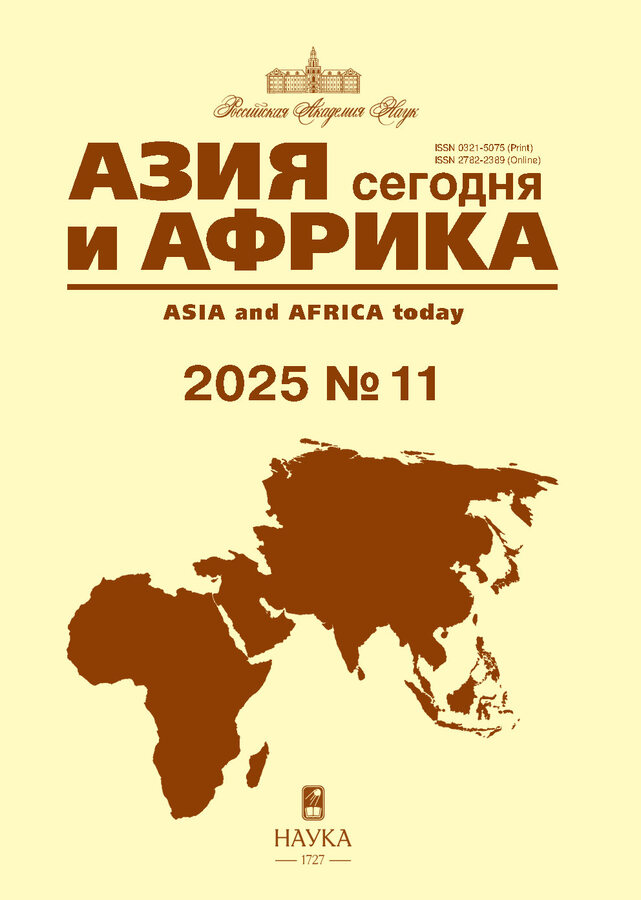Prospects for Nuclear Energy in BRICS+ within the New Technological Order
- Authors: Zvorykina Y.V1, Vinogradova E.M1
-
Affiliations:
- MGIMO University
- Issue: No 11 (2025)
- Pages: 64-74
- Section: BRICS today
- URL: https://journal-vniispk.ru/0321-5075/article/view/351625
- DOI: https://doi.org/10.31857/S0321507525110073
- ID: 351625
Cite item
Abstract
About the authors
Yu. V Zvorykina
MGIMO University
Email: kpss2008@mail.ru
ORCID iD: 0000-0002-9282-7114
Dr.Sc. (Economics), Professor, Basic Department of PJSC Transneft "Foreign Economic activity in the field of energy resources transportation" Moscow, Russia
E. M Vinogradova
MGIMO University
Email: kategrape@yandex.ru
ORCID iD: 0009-0005-2584-9689
Moscow, Russia
References
- Masterpanov A.M. 2024. Energy Cooperation of the BRICS Countries: History and Prospects. *Energy Policy*. № 3. Рр. 20–33. (In Russ.). doi: 10.46920/2409-5516_2024_31839_20
- Lokonova E.L., Zheleznyakova A.V., Ryabyshev M.V. 2025. The future of nuclear energy in the context of modern social changes. *Nuclear Safety*. № 15. Рр. 107–116. doi: 10.26583/gns-2025-02-11
- Vorotnitsky V.E. 2022. On the systemic approach to improving energy and economic efficiency of electric grids in the new technological paradigm. *The Power Engineer*. № 4. Рр. 14–19. (In Russ.). doi: 10.34831/EP.2022.68.92.004
- Kovalev Yu.Yu., Porshneva O.S. 2021. BRICS countries in international climate policy. *RUDN Journal of International Relations*. № 1. Рр. 64–78. (In Russ.)
- Abramova I.O., Murtazina M.Sh. 2018. Green transport logistics as a tool for improving the economic activities of transport companies. *Eurasian Scientific Journal*. № 3. Р. 2. (In Russ.)
- Derevtsov S.V. 2025. Evolution of Technological Paradigms and Their Impact on the Development of Industry in Resource Regions. *Regional and Sectoral Economics*. № 3. Рр. 138–148. (In Russ.). doi: 10.47576/2949-1916.2025.3.3.018
- Trzeciak, A.M.G. 2020. Simulação de Eventos no Detector do Experimento Neutrinos Angra Dissertação (Mestrado em Física. Dissertation. Universidade Estadual de Londrina.
- Allenykh M.A., Anisimova A.I. 2020. The floating nuclear power plant "Akademik Lomonosov" as a new vector of nuclear energy development. *Drucker Bulletin*. № 3. Pp. 166–179. (In Russ.). doi: 10.17213/2587-8719-2020-3-166-179
- Semenov V., Shchepetina T., Popov S. 2021. Development of small nuclear power plants: Challenges and prospects. *Energy Policy*. № 10. Pp. 48–63. (In Russ.). doi: 10.46920/2409-5516_2021_10164_48
- Smolyakov A.S., Gorbenko A.V., Lozenko V.K. 2024. Methodology for Assessing Potential Consumers and Selecting Optimal Sites in Isolated and Hard-to-Reach Settlements of the Far East for the Development of Distributed Generation. *Economics: Yesterday, Today, Tomorrow*. № 9A. Pp. 407–418. doi: 10.34670/AR.2024.19.89.041
- Belyavskiy S.V. 2024. Influence of Fuel Rod Composition on the Thermophysical Characteristics of a Small Pressurized Water Reactor. Dissertation for the degree of Candidate of Technical Sciences. National Research Tomsk Polytechnic University. P. 55. (In Russ.)
- Williams O. 2014. Nuclear Energy in South Africa: An Opportunity for Greater Energy Efficiency and Energy Security. *Eras Journal*. № 16. Pp. 80–100. doi: 10.3316/ielapa.345534441296776
- Suman S. 2018. Hybrid nuclear-renewable energy systems: A review. *Journal of Cleaner Production*. № 181. Pp. 166–177. doi: 10.1016/j.jclepro.2018.01.262
- Tang Z. et al. 2025. Study on modular design methodology of marine SMR system based on fuzzy hierarchical clustering and improved genetic algorithm. *Progress in Nuclear Energy*. P. 105739.
- Issa Sukhel Kamel. 2024. Prospects for the development of Russian-Arab cooperation in energy and energy security. *Scientific Works of the Free Economic Society of Russia*. № 5. Pp. 222–234. (In Russ.). doi: 10.38197/2072-2060-2024-245-5-222-234
- Donskikh D.V., Melnikov A.O. 2025. Atomic energy political and economic factors of development. *National Security / nota bene*. № 2. doi: 10.7256/2454-0668.2025.2.69707
- Batrachenko T.S., Stakhanova P.V., Kiryanova E.V. 2024. A brief overview of China's largest nuclear power plants and fourth-generation reactor projects, including small modular reactors. *Proceedings of the VI International Student Scientific Conference "Innovative Mechanisms for Managing the Digital and Regional Economy".* Moscow. Pp. 342–362. (In Russ.)
- Listopadov I.Yu., Semenov E.V. 2019. Nuclear energy as Egypt's competitive advantage in organizing value chains in Africa. *Modern Science*. № 12–1. Pp. 162–168. (In Russ.)
- Pelo H.L. 2013. Evaluation of an advanced fault detection system using Koeberg nuclear power plant data. Dissertation (Master of Science in Nuclear Engineering). Potchefstroom: North-West University. P. 192.
- Lesego E. Moloko et al. 2024. Clustering and uncertainty analysis to improve the machine learning-based predictions of SAFARI–1 control follower assembly axial neutron flux profiles. *Annals of Nuclear Energy*. № 206. P. 110630.
- Filippova A.V. 2023. Global trends in the development of world electric power industry in the context of transition to renewable energy sources. Economics, Entrepreneurship and Law. № 9. Рр. 3413–3426. (In Russ.). doi: 10.18334/epp.13.9.118732
Supplementary files











